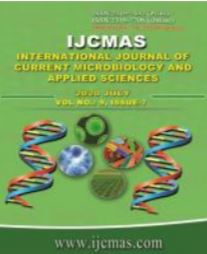


 National Academy of Agricultural Sciences (NAAS)
National Academy of Agricultural Sciences (NAAS)

|
PRINT ISSN : 2319-7692
Online ISSN : 2319-7706 Issues : 12 per year Publisher : Excellent Publishers Email : editorijcmas@gmail.com / submit@ijcmas.com Editor-in-chief: Dr.M.Prakash Index Copernicus ICV 2018: 95.39 NAAS RATING 2020: 5.38 |
Brinjal is an important nutritional vegetable crop of tropical and subtropical regions. It is highly responsive to various tissue culture techniques. The aim of this study was to develop an efficient protocol to standardize the concentration of sterilants for seed and explants sterilization for in vitro germination and regeneration respectively. The explants used are cotyledonary leaf, stem and hypocotyl of in vitro grown brinjal var.KKM1. For sterilization of seeds and explants, 5% sodium hypochlorite treatment for 3 minutes is the most effective sterilant concentration against the microbiological contamination. In subsequence, the regeneration protocol was optimised for the brinjal var.KKM1. From the in vitro grown seedlings, different explants such as hypocotyl, cotyledenary leaf and stem were taken for callus induction. Highest number of callus was obtained in MS medium containing 2 mgl-1 NAA and 0.5 mgl-1 BAP. Among the explants used, cotyledonary leaf and stem were highly responsive to callus induction. Further the callus was proliferated in the same media and was used for regeneration by using different plant growth hormones. Regeneration of shoots from callus was more efficient in MS media containing 2.0 mgl-1 BAP, 1.0 mgl-1 Kn and 0.5 mgl-1 NAA. The successful rooting was recorded on ½ MS media supplemented with 0.5 mgl-1 IBA. This in vitro regeneration process might be useful for producing disease free plants especially little leaf of brinjal, the most common infection in the brinjal var.KKM1.
 |
 |
 |
 |
 |